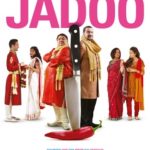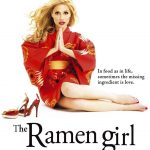Home » Posts tagged 'Film review'
Tag Archives: Film review
Film Review: Chocolat (2000)

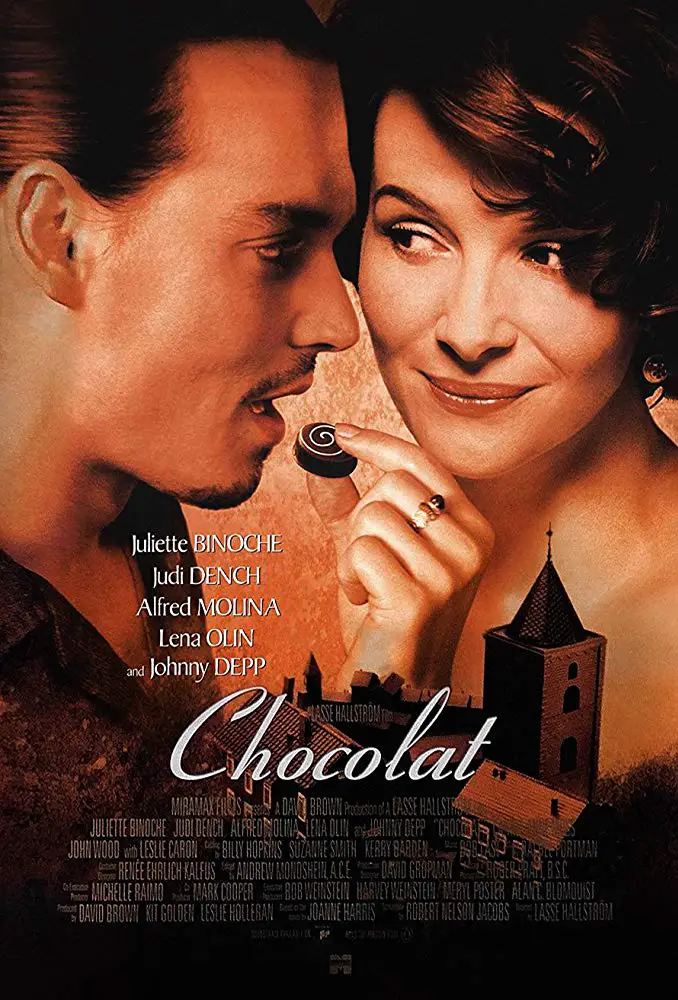
Director : Lasse Hallström
Writers: Joanne Harris (novel)
Country: UK/US (Film is set in France)
Food Consultant: Walter Bienz (chocolate expert)
Film Rating: 8/10
Foodie Rating: 8/10
Cocoa-based joy lies at the heart of Lasse Hallström’s romantic drama set in 1950’s France. First a word of warning. Note the lack of ‘e’ in the title. If you get Prachya Pinkaew’s 2008 film Chocolate you may well be in for a shock if you were expecting some sort of Milkybar huggy romance film. Instead you would see a remarkable, exciting and somewhat violent Thai martial-arts film (which is highly recommended if you like remarkable, exciting and somewhat violent Thai martial-arts films) rather than the rather more sedate environment of period piece Chocolat, a film about religion, society, families, romance and, of course, chocolate.
It’s 1959. Vianne Rocher (Juliette Binoche) and her daughter Anouk (Victoire Thivisol) arrive at a small village, seeking accommodation and business premises. They find a useful property which suits their purposes in a tranquil location in France. Vianne’s skill – indeed her destiny – lies with her ability to be an inventive and perceptive chocolatier who can accurately detect the particular desires of any potential customer. Furthermore, she is a compassionate and caring person who utilises her distinct culinary abilities to absolve people of social or psychological issues even if they were unaware of those problems themselves.
But the apparent idyll of the delightful location has some problems. Vianne arrives during Lent and the village’s dictatorial mayor Comte de Reynaud (Alfred Molina) has a strong interpretation of biblical edicts and insists on his parishioners steadfastly following the rules of fasting and avoiding the temptations of glorious gluttony. He even alters the parish priest’s sermons to dictate his own religious views. Vianne carries on regardless, determined by her destiny to aid the villagers with their personal problems through the medium of chocolate; these include family conflicts, a housewife being beaten by her drunken husband and her curmudgeonly and melancholy landlady, a grandmother denied access to her artistic grandson because she fell out with her daughter, a lady who subscribes to the mayor’s dominant beliefs. When a group of river Roma arrive at the outskirts of the village this creates further tensions particularly when Vianne forms a friendship with the anti-establishment but delightful guitar playing Roux (Johnny Depp). Naturally the authoritarian Comte de Reynaud sees this as a further plot to undermine his idealistic perceptions of virtue for the village and seeks to remove both the Roma and the chocolatier. But perhaps his own sins are to become apparent especially, it seems, when chocolate is involved.
There is so much to enjoy in the food depiction in the film from its creation to its final instigation. Vianne instigates her skills in multiple ways to accentuate her art and administer the correct form of chocolate for her many customers. So there’s chilli in the hot-chocolate concoction that has exceptional taste and a variety of aphrodisiac sweets, mood enhancers and delicately modelled confections that serve as an advert for her artistry as much as they emphasise the visual delights of her amazing products. Chocolate may be considered to be an indulgent food but here it is used to heal lost souls. There are a few moments of culinary horror amidst the joy of chocolate as we experience a scene of outrageous gorging – during Lent! – which forms part of the dénouement in the film’s relationship between mayor and chocolatier. And there is more trouble when in a moment of conflicting interests between mother and daughter concerning their respective futures when a valuable container of cacao is smashed, the dust powder scattered amidst the shattered pottery.
Johnny Depp return to confection as the chocolatier Willy Wonka in Charlie and the Chocolate Factory, but Juliette Binoche’s Vianne provides gastronomic supremacy way ahead of Tim Burton’s fantasy chocolate intermixture.
A delightful story about families, food, human frailties and redemption, Chocolat is a joy for both foodies and hopeless romantics.
You can buy the film here or the book here in the UK or the film here and the book here in the US.
If you click the link and decide to make a purchase we will earn a small commission, at no cost to you, which helps towards running this site.

Film Review: What’s Cooking? (2000)

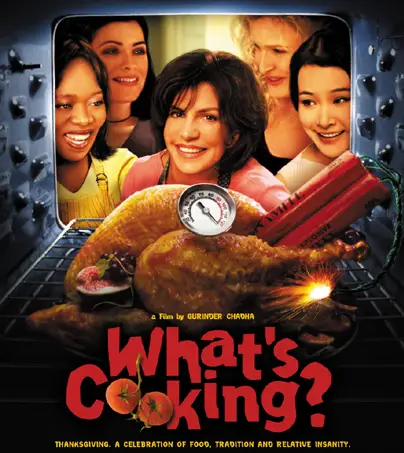
Writer/Director: Gurinder Chadha
Country: US/UK
Cuisine: Multiple
Film Rating: 7/10
Foodie Rating: 8/10
Gurinder Chadha is fond of depicting meals in her films, to the extent that many of them feature food in the titles. From her early feature Bhaji on the Beach (1993) and as a writer with The Mistress of Spices (2005), food is an inherent part of the lives of the protagonists and their communities: from Bend It Like Beckham (2002), whose tagline even emphasises the food – “Who wants to cook Aloo Gobi when you can bend a ball like Beckham?” – to the celebratory wedding and betrothal musical Bride and Prejudice (2004). In What’s Cooking? the food on offer is being prepared within a Los Angeles neighbourhood where families, their friends and acquaintances gather together to celebrate Thanksgiving. Being a Gurinder Chadha film, the many cross-cultural aspects of her characters are brought to the fore as well as their individual ideological and personal desires which create conflict, romance, misunderstandings and humour. And What’s Cooking? embraces all these elements with its depiction of celebrations with a large variety of cultural cuisines expected by all and sundry (as well as a KFC bargain bucket to mitigate a cooking disaster) so the titular question is distinctively accurate.
With any feast, ingredients need to be purchased, prepared and cooked in the kitchen ready for consumption at the family feast. And in this way the film covers the whole process from conception and preparation to serving and eating, from starters to desserts with accompanying beverages for its ravenous protagonists. But this isn’t just about the food. Each family’s meal may be central to their day but families are complicated and have all sorts of issues to deal with. And they aren’t just cultural, they are also inter-generational. What’s Cooking also refers to the family problems and secrets that are all building up and may well be revealed before the day is through – whether it’s an estranged husband who has been invited to the family’s celebration not knowing that his former wife’s new boyfriend will also be joining them; a couple who have problems with their children – their youngest son is hiding a gun and their eldest has lied that he cannot attend this year due to college work but has secretly joined his girlfriend’s family across the road; elderly parents coming to terms with their daughter’s lesbian lover; a wife dealing with an interfering mother in law in the context of a family row over the son’s desire to choose his future.
What’s Cooking? is a true smorgasbord of both food and culture in that each family has a different heritage and, as such, the food being prepared reflects their traditional cuisine within the context of the quintessential American holiday of Thanksgiving. The ‘prepare and eat’ element, whilst mouth-watering, really forms the background of the narrative; it is the characters, with their desires, their problems and their conflicts that add the spice to proceedings. Relationships, particularly those between family members, are complex and What’s Cooking? opens the lid of the cooking pot to reveal the contents where tensions are simmering and could reach boiling point at any time.
At turns funny, sweet, confrontational, sad and occasionally poignant, What’s Cooking? is a film with food and family firmly at its heart.
You can buy the film here in the UK and here in the US.
If you click the link and decide to make a purchase we will earn a small commission, at no cost to you, which helps towards running this site.

Babette’s Feast Review
Babettes gæstebud (1986)

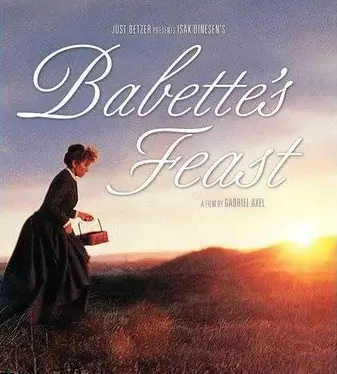
Director: Gabriel Axel
Gastronomic Consultant: Jan Pedersen
Country: Denmark
Cuisine: Danish, French
Film Rating: 7/10
Foodie Rating: 4/10 (first half) 9/10 (conclusion)
Initially there is a touch of confusion: You are half an hour into Babette’s Feast and the eponymous Babette (Stéphane Audran), a housemaid for two elderly sisters Filippa (Bodil Kjer) & Martine (Birgitte Federspiel), daughters of the philanthropic pastor, has briefly popped into a dining room full of parishioners from the small coastal village in Jutland, Denmark, but has nothing appetising to serve.
A refugee from France, Babette has joined the household after being sent there by family friend Achille Papin (Jean-Philippe Lafont), who had taken a fancy to one of the sisters many years ago while teaching her to sing. The letter accompanying Babette indicates that ‘she can cook’ and so the kindly sisters take her in; she resides in the house working as the housemaid in exchange for lodging and food. She has to learn to prepare local dishes as well as speak Danish in order to fulfil her new role.
Ale bread soup is the first delicacy she is taught to cook – a spoon from a bowl consumed dark-brown mash of stale bread and…. ale. And so she continues to produce such bland culinary fare, for prayer and song accompany the meals that are served to the sisters and parishioners in this tiny community, although she is adept at purchasing the best quality produce and will not accept overpriced goods..
Babette does, however, hold some lottery cards back in France and her friend there ensures her continued participation. Over a dozen years after leaving her home country she wins 10,000 Francs. With the money arriving in time to commemorate what would have been the one hundredth birthday of the now deceased pastor, Babette decides to celebrate with a proper dinner. It turns out to be a feast but the villagers don’t want to acknowledge any sinful depravity associated with the celebration. All through her time washing salted fish and making ale bread soup in Jutland, Babette has had a hankering for home cuisine so splashes her new cash on procuring the ingredients to create and serve a lavish multiple course gastronomic extravaganza.
This is a film about an virtuous community, where the sisters have led a life of worship and charity, where frivolity is shunned and enjoyment of food considered to be self-indulgent. The religious group, whilst still gathering together, bicker amongst each other – their lives of austerity leading to petty squabbles. Babette conforms with the expectations of the society that has given her refuge but clearly yearns for her former life.
The feast affords her the opportunity to retain a flavour – if you will – of the culinary joys that she used to know and enjoy. The dinner includes Potage à la Tortue, blinis (although the ingredients, like much in the feast are imported so no local fish roe here, just the beluga), a salad course, Cailles en Sarcophage and a variety of fruits, cheeses. And of course there is a very good reason as to why this is such a special occasion.
Babette’s Feast is a gentle film, underplayed throughout, and its primary message is that just a soupçon of decadence and indulgence, hell, even a little gluttony, does you good.

Film Review: The God of Cookery (食神 1996)

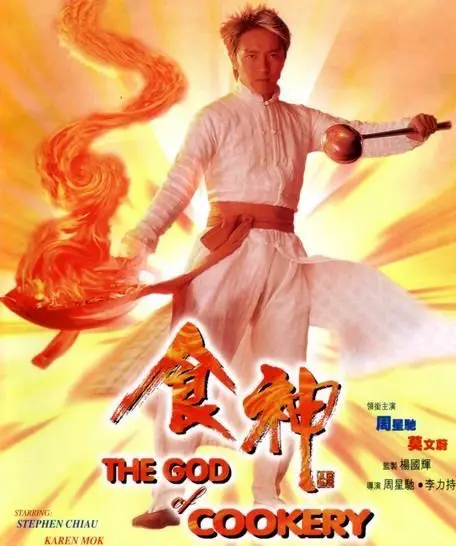
God of Cookery
Director: Stephen Chow Sing Chi (周星馳)
Country: Hong Kong
Cuisine: Chinese / Cantonese
Film Rating 6/10
Foodie Rating 5/10
The world of food is tough in more ways than one. The bourgeois rich insist on the distinctive, the unique and the best and are willing to pay for it, whilst the poor survive on what they can get. Then there is celebrity and publicity with competitions which ensure that skilled chefs become either rich or rejected largely because of trends and interpretations of the quality of the food, style, taste or even the performance of its chef. Self-declared God of Cookery (Stephen Chow) is extravagant, talented and very rich (partly the result of a dubious business empire which aggrandises his personality and food), able to detect the slightest of alterations in the quality of dishes created, savage in his criticisms (although accurate in detail) and a proficient user of culinary implements as he wields his chopper with remarkable ability. Martial arts meet culinary arts. Bull Tong (Vincent Kok) is his rival and a televised competition chaired by The Princess of Taste (Nancy Sit) leads to the vivacious cooking deity rejected to the streets where his need to make good food in a manner that satisfies his distinctive palate is put to the test. He comes across street-food maker Turkey (Karen Mok) who has surprising skills with her unique dishes (at a reasonable price) of pissing shrimp and beef balls. (You read that right!) With rival businesses, gangland trouble and a desire to return to the limelight with a restored reputation God of Cookery joins up with Turkey to make the ultimate in culinary perfection, the pissing beef ball.
The world of Stephen Chow Sing Chi (周星馳) is one that is filled with comedy (from slapstick, hilarious, offensive, inappropriate or just genius) but also physical prowess that mixes martial arts with comedy in a way that is distinctly different than the Buster Keaton style stunts of Jackie Chan. And so we have football in Shaolin Soccer (probably his best known film outside Hong Kong along with Kung-Fu Hustle) and also a lot of social commentary that addresses class and community in an often offensive manner which becomes funny when you understand the context and tone in which it is delivered. But here The God of Cookery does tackle social issues, media manipulation, business riches impeding the populace and criminal fraternities being comparable in their own way and yet – it’s a foodie film. With martial arts. Call it Kung-Food if you will. So here we have chopping and mincing as swift and accurate as you can imagine, ingredients juggled into place, eggs cracked open and whisked with speed and dexterity, meatballs filled with alarming accuracy. Oh, and deadly chopsticks as well as woks and cooking implements of all varieties that add to the mayhem. Sometimes the perpetrators of evil are served up as if they were cooked dishes themselves. The contrast between posh restaurants and street food are depicted in their clientele, their production and, of course, their means of depicting kung-food mayhem and gastronomic expertise. The similarities of the elite and the normal are shown to be different in how society reacts to them but in the world of The God of Cookery this is irrelevant as it focuses on the joy of great food, whatever the background of its creator. Just don’t forget to remove the excrement from the entrails dishes. Good advice there. May not be to everyone’s taste (unlike the pissing beef balls, of course) but still kung-food madness with socially underlined messaging that packs a punch – often between preparing ingredients.

Film Review: Eat Drink Man Woman

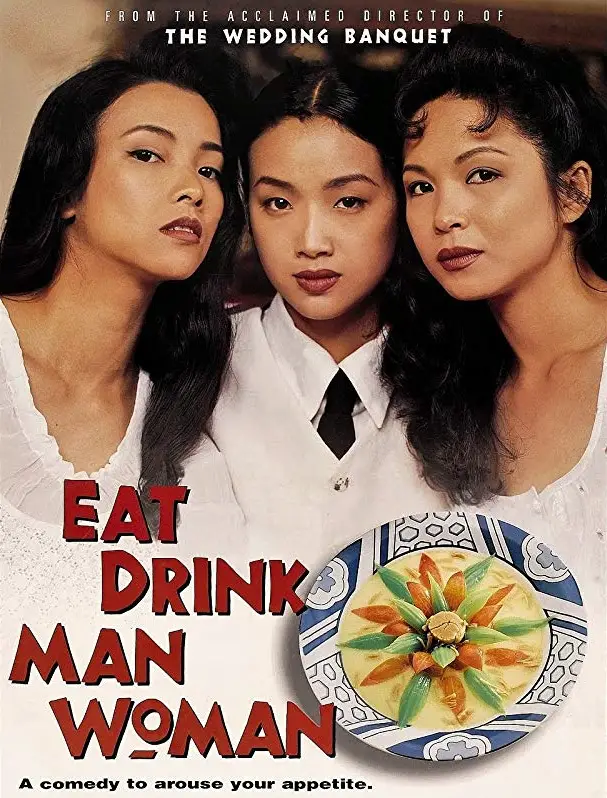
Writer/Director:Ang Lee
Country: Taiwan
Cuisine: Chinese
Film Rating 9/10
Foodie Rating 10/10
The only problem with this foodophile classic is its title: it should be Eat Drink Man Women as the relationships centre on protagonist Chu (Sihung Lung), his three daughters as well as his friend, her mother and her daughter. Chu is a former chef and the story revolves around the women who define his life following his retirement and widowhood examining their relations with him and each other, all within the context of a great deal of amazing food. His daughters have complicated lives but they retain a sense of duty to their father, so every week the family gather for an auspicious Sunday feast where Chu creates the most delicious meals as they have to discuss their lives, their prospects and their woes. Jia-Chien (Chien-Lien Wu), despite her business acumen and success as an airline manager, always wanted to develop her own cooking abilities. Jia-Jen (Kuei-Mei Yang) has had relationship issues of her own and has converted to Christianity while the youngest sister Jia-Ning (Yu-Wen Wang) is still a student, seeking qualifications and dealing with both friends and boyfriends as they come and go. And then there’s Chu’s friendship with Liang Jin-Rong (Sylvia Chang). Shocked that her daughter goes to school with less than top-quality food in her lunchbox, he instigates a secret arrangement with the young girl whereby he replaces her lunchbox with one filled with his own exquisite concoctions, eating the original food so as not to waste the somewhat inferior cooking. This creates a lot of cultural cross-generation food empathy as these exceptional lunches pique the interest and enthusiasm of her classmates who later provide Chu with orders for particular dishes from his extensive repertoire.
When watching Eat Drink Man Woman it is advisable to do so on a full stomach. The opening sequence alone will have you salivating at the delicious dishes on offer as Chu prepares Sunday lunch for his daughters. This is not a standard meal that’s simply been thrown together, the care and attention he puts into each and every dish reflects his way of showing his daughters how much he cares for them; the finished feast far too much for the family to consume. His daughters have grown up to be critical of his culinary skills, noting that he may not have followed the recipe precisely and are open in their feedback, certain of their judgement in his abilities. But his culinary expertise is his way of maintaining the family within a home where food is the centre of everything. The Sunday lunch also gives the whole family the opportunity to make announcements about their lives and their plans for the future, including the occasional bombshell. The dinner table provides the focal point for family interactions. Director Lee then cuts to specific scenes that delve into the individual stories of this complicated family.
Chu’s is a practical kitchen – a chef’s kitchen: white tiled, with a seriously impressive array of knives, cooking implements and vessels, all of which have been well used over the years. Much of his food is so fresh some of it is still alive – fish writhing in pots – just moments before preparation begins. Chu is not squeamish – he knows exactly where his food comes from and how to prepare it. Sizzle, steam, fizz, fry, boil – all the techniques of classic Chinese cookery are on show. The dishes are many and varied – the portions far too large for the family of four to devour – but every Sunday lunch is a sumptuous feast with plenty of leftovers for the week ahead.
Eat Drink Man Woman places food as a central part of this story of a complicated family living complicated lives. As anyone who has been overfed by a kindly relative knows, the over-riding message from Eat Drink Man Woman is that, no matter how complex and difficult life can be, food is not simply nourishment, it represents love.
You can buy the DVD (or the NTSC version) or the Ang Lee box set trilogy which also contains more of his foodie films, The Wedding Banquet and Pushing Hands.
If you click the link and decide to make a purchase we will earn a small commission, at no cost to you, which helps towards running this site.



